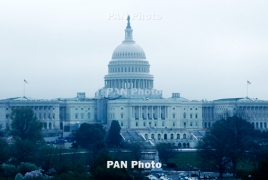U.S. lawmakers commemorate Armenian Genocide on Capitol Hill April 28, 2016 - 18:48 AMT PanARMENIAN.Net - Members of U.S. Senate and House taking part in the annual Capitol Hill remembrance of the Armenian Genocide stressed on Wednesday, April 27 that the United States, as a matter of national policy, should be working toward a truthful and just recognition of this crime, reported the Armenian National Committee of America (ANCA). During the evening remembrance program, legislators raised serious concerns, on a bipartisan basis, regarding the dangerous modern day implications of continued official U.S. and international indifference to a century of unchecked anti-Armenian violence and genocide, even amid warning signs of renewed atrocities against Nagorno Karabakh. "We want to thank each of the legislators who joined us today, and the many more who are working to stop official U.S. complicity in Ankara's genocide denials and bring an end to the Administration's troubling silence in the face of Azerbaijan's reckless military escalation against Nagorno Karabakh," said ANCA Executive Director Aram Hamparian. "Sadly, we are seeing today - in Azerbaijan's attacks all along the Nagorno Karabakh line of contact - the results of longstanding U.S. appeasement of Turkey and international indifference to Azerbaijan's anti-Armenian aggression, even amid clear warning signs of renewed atrocities." A prominent theme was the escalation of Azerbaijan’s attacks against Nagorno Karabakh, which claimed several hundred Armenian and Azerbaijani lives between April 2nd and 5th. Constant ceasefire violations continue to undermine peace in the region, with three members of Artsakh's defense forces killed in just the last two days. Members of Congress called for zeroing out military aid to Azerbaijan, with many urging an increase in assistance to Artsakh in light of recent violence. The annual Capitol Hill observance of the Armenian Genocide was organized by the Congressional Armenian Caucus in cooperation with the Embassy of the Republic of Armenia, Office of the Republic of Nagorno Karabakh in the U.S. and Armenian American organizations.  The Armenian Genocide The Armenian Genocide (1915-23) was the deliberate and systematic destruction of the Armenian population of the Ottoman Empire during and just after World War I. It was characterized by massacres and deportations, involving forced marches under conditions designed to lead to the death of the deportees, with the total number of deaths reaching 1.5 million. Six total incidents have burned 19 old-growth trees. Friday night 8 trees were torched along the beautiful main entrance. The EU does not intend to conduct military exercises with Armenia, Lead Spokesperson for EU Foreign Affairs and Security Policy Peter Stano says. Hikmet Hajiyev has said that there is no place for USAID operation in Azerbaijan any longer. A telephone conversation between Putin and Pashinyan before the CSTO summit is not planned, Peskov says. Partner news |